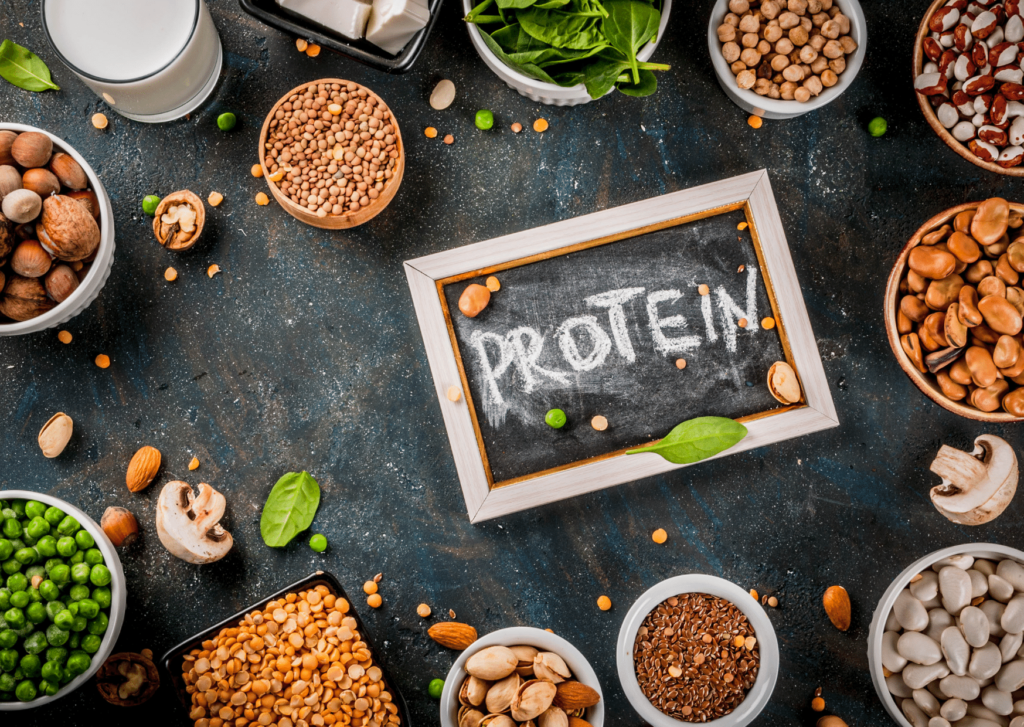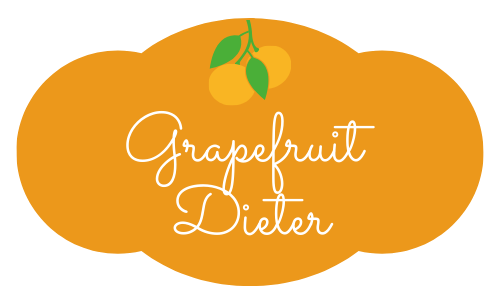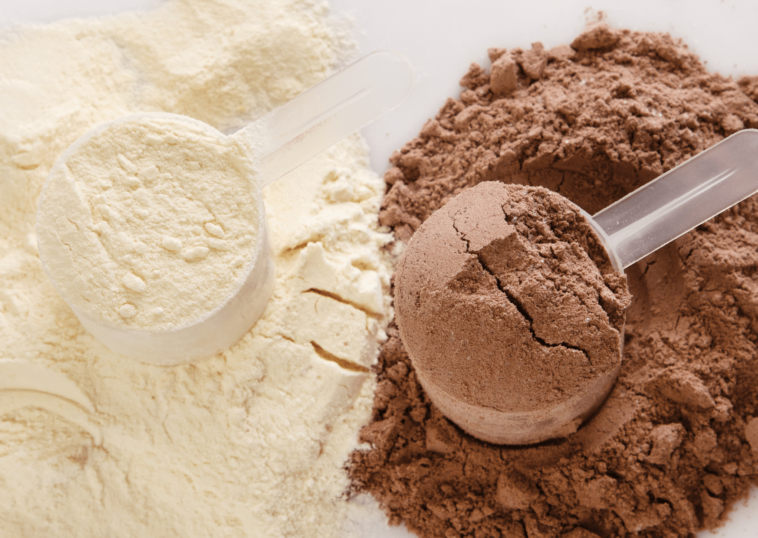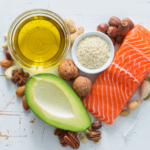At some time in life, we have all heard the word protein. However, we don’t really focus on its importance .
Proteins are part of various tissues in our body, from muscle fibers, to the brain and other vital organs such as the heart.
Including the recommended amount per day not only guarantees proper functioning of these organs but is also associated with other benefits in nutrition.
This article looks at the importance of protein, what are the benefits, and how much is needed per day.
What are proteins?
Proteins are one of the 3 fundamental macronutrients. Like fats and carbohydrates, they are one of the most important components for our body.
To understand what proteins are, we have to go to a smaller scale and look at their structural units: amino acids.
The amino acids, as if they were the beads of a necklace, unite one after the other to form a long chain until they form the first structure of the protein.
Then according to the types of amino acids by which the proteins are formed, these unions give it a particular shape. This form is what gives it the function and plays a role in the importance of proteins.

What is the importance of protein
The importance of proteins in nutrition is diverse. These molecules are of great importance for the regeneration of the muscular system, the hormonal balance as well as to prevent sleep disorders.
The most known importance of proteins is muscle rebuilding. Without this macronutrient it is impossible to increase muscle mass in the body.
Proteins are like the building blocks of muscles; building a house without the materials is really impossible.
However, the importance of protein is not limited solely to the muscular system. This is one of the nutrients that is part of almost all the tissues of our body.
Proteins are important to strengthen the immune system, the nervous system and even the enzymes that participate in digestion are proteins by definition.
To emphasize its importance, the DNA molecule itself has as its main function to provide exact information on how to make proteins. Like an orchestra conductor, DNA commands the body to create hemoglobin and other highly important proteins.
In short, its importance is vital, without protein there is no life.
How many proteins do you need per day?
An average person needs about 1.5 g of protein per body kilogram per day. This is the equivalent of about 105 g per day for a 70 kg man.
The amount of protein a person needs per day varies according to their activity. When sports are played on a regular basis, this value can increase by up to 20%.
The recommended (minimum) amount of protein is 0.8 gram per kilo of body weight for a sedentary person and up to a maximum of 2.0 grams for high-performance athletes (2,3,6) .
To achieve muscle hypertrophy, some trainers recommend eating more protein. (3)
On the other hand, it has been proven that the digestive system can absorb 10-15 grams of protein per hour. Therefore, the amount of protein needed per day should be distributed between 20-30 g per meal. This is what is known as protein timing.

Protein quality
The importance of protein in the diet does not lie only in quantity but in its quality. To obtain the benefits of proteins, you have to know how to choose them.
The best proteins are those that provide a complete amino acid profile and are absorbed quickly. These are called proteins of high biological value.
Proteins of high biological value are found in a wide variety of foods, particularly those of animal origin. Although they are also found in vegetables, cereals and seeds. Egg white is one of the best known. Including good quality protein foods in the diet is of great importance in nutrition.
The most difficult amino acids to find in food and most important in the muscular system are the branched chain amino acids: leucine, isoleucine and valine. These are the first to begin to destroy themselves when intense physical effort occurs. If they are not included in the diet, muscle mass is likely to be lost.
Protein benefits
Proteins participate in all vital systems and functions of our body.
In any case, it is correct to affirm that a certain amount of proteins has the benefits of improving muscle recovery as well as optimizing metabolic processes in our body.
In addition, some particular proteins such as glucosamine and chondritin are essential for preventing joint diseases. The benefits of proteins are:
- Improve the neural system
- Prevent type 2 diabetes
- Regulate cholesterol levels
- Improve muscle recovery processes
- Ensuring joint health
- Prevent insomnia disorders
- Ensure hormonal regulation
- Increased fertility in women
Foods with the most protein
As a general rule, it can be said that products of animal origin are the foods that have the highest amount of protein. Eggs, meats and dairy products have the best absorption percentage.
For those who carry out a vegetarian diet, alternatives such as nuts and pseudo-cereals can effectively provide the amount of protein that is needed per day.
White cheese or lean cheese are the dairy products that contain the highest amount of protein (20-30 g per 100 g). A figure comparable to the content of meat. Hard and semi-hard cheeses like Parmesan have higher amounts of fat. Abusing the consumption of these foods is not the best idea to cover the amount of protein that is needed per day.
| Foods | Protein content in 100 g | % absorption |
|---|---|---|
| Whey Supplements | 70 - 75 g | 95 - 99% |
| Meats (beef, chicken, fish) | 20 - 30 g | 95 - 99% |
| Dairy products | 10 - 30 g | 90 - 99% |
| Eggs | 12 - 15 g | 95 - 99% |
| Nuts | 10 - 25 g | 65 - 70% |
| Cereals and pseudo-cereals | 12 - 15 g | 40 - 60% |
| Fruits and vegetables | 2 - 3 g | 65 - 70% |
Table of protein content in food vs % absorption.
The importance of vegetable proteins
The protein content in plant foods is generally lower than in foods of animal origin. As a general rule, seeds and flowers are foods with a higher amount of protein than the stems and leaves of the same plants.
Some plants and plant derivatives (such as soy protein) are high in plant protein content. However, its quality is usually relatively lower.
Although a large number of plant foods have lower protein quality, they can be combined for better results. For example, rice protein is high in methionine but low in lysine. In legumes the amino acid content is inverse.
If these two plant foods are consumed together, the amino acids of one protein can compensate for the deficiency of the other, resulting in a protein of high biological value. (8)
This is very important for those who follow a vegan diet .
Mushrooms are high in protein content
Foods from the Fungi Kingdom (mushrooms) are an excellent option to meet our daily protein needs.
Combining mushrooms, nuts, spinach with a serving of beans is enough for a normal person to reach the necessary amount of protein per day. However, it is also of great importance to take into account the absorption percentage and the correct amino acid combination.
| Food | Protein content 100 g | % absorption |
|---|---|---|
| Soy protein | 30 - 50 g | 90 - 95% |
| Dried mushrooms | 20 - 30 g | 70 - 80% |
| Beans | 20 - 25 g | 65 - 70% |
| Lentils | 20 - 25 g | 65 - 70% |
| Chickpeas | 20 - 22 g | 65 - 70% |
| Nuts (various) | 10 - 25 g | 65 - 70% |
| Spinach | 3 - 4 g | 65 - 70% |
| Potatoes | 2 - 3 g | 65 - 70% |
| Fruits (various) | 2 - 3 g | 65 - 70% |
| Berries | 1 - 2 g | 65 - 70% |
Table of the amount of foods with proteins of vegetable origin

Protein deficiency signs
The lack of protein in the diet causes a wide variety of symptoms, from a loss of muscle mass, chronic fatigue, mood swings, and a greater difficulty in concentrating.
The lack of protein is frequent in people who lead a sedentary lifestyle and follow an unhealthy diet. Ensuring that you provide an adequate amount of protein is of great importance in terms of nutrition.
With age, protein synthesis gradually slows down. This is the case of collagen, a fundamental protein for the support of the organs and the maintenance of the skin. Upon reaching adulthood, the body begins to lose about 1-2% collagen per year. Taking hydrolyzed collagen is a good strategy to prevent it. (5)
Protein deficiency in women
Protein deficiency in women can cause hormonal changes and menstrual cycles. According to studies, carrying out a protein diet is associated with low testosterone in women. Some doctors have even used it as a treatment to improve fertility. (4)
These results suggest a close relationship between the amount of protein ingested with female reproductivity. Adequate consumption of this macronutrient is of great importance for a correct hormonal balance, as well as to ensure the production of estrogens .
SUMMARY
Proteins are one of the 3 essential macronutrients.
The importance of proteins in biological terms is simple: without them there is no life.
The importance of proteins in the human body ranges from recovery, proper nervous function and the muscular system.
The structural components of these molecules are amino acids. Those of good quality (high biological value) are those that provide essential amino acids and are absorbed quickly.
One of the myths about protein is that the more you eat the better. The recommended daily allowance for an average person is 1.0 – 1.2 g per kilogram of this macronutrient by body weight. Eating more than this amount has no additional nutritional benefits.
The foods with the most protein are meats, eggs, and dairy products. Including pseudo-cereals, mushrooms and nuts is of great importance to cover the daily needs or supply your body with sufficient amounts, especially when you’re exercising daily.
- Protein intake and exercise for optimal muscle function with aging: Recommendations from the ESPEN Expert Group. Source
- How much protein can the body use in a single meal for muscle-building? Implications for daily protein distribution. Source
- Nutrient timing revisited: is there a post-exercise anabolic window? Source
- Dietary protein intake. Source
- Decreased Collagen Production in Chronologically Aged Skin. Source



